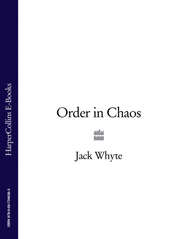По всем вопросам обращайтесь на: info@litportal.ru
(©) 2003-2024.
✖
Standard of Honour
Автор
Год написания книги
2018
Настройки чтения
Размер шрифта
Высота строк
Поля
“Yes, my liege, it is…yet I would beg the privilege to be allowed to think upon this for a time.”
“Think about it for as long as you wish, Henry, but think not to ignore my wishes. I will have it thus, and you’ll refuse me, as your true liege lord, at your peril.” Richard fell silent then, uncaring of St. Clair’s reaction to his words, and sat stiffly, his brow knitting as he glanced around him, half turning towards the door at his back.
“Where is your son, young André?” He turned back to face his host. “Still out tomcatting at this time of night? He had better be, or I’ll not take kindly to his slighting me.” He stopped, struck by the expression on Sir Henry’s face. “What’s wrong, Henry? Something’s amiss, I see it in your eyes. Where is the lad?”
The door opened at that point and a servant entered, his head obsequiously downcast, and scurried towards the fireplace, clearly intending to add more fuel. Henry raised his hand and voice, stopping the fellow in his tracks and dismissing him instantly. As the man hurried away, closing the door noiselessly behind him, his master stood and removed his heavy mantle, folding it gently over the back of his chair before he himself moved to the fireplace. There he silently set about selecting logs and placing them carefully atop the fire, grateful for the chance to collect his thoughts. He had forgotten how disconcertingly intuitive Richard Plantagenet could be on occasion, and as he placed each log and thrust it down into the coals with his booted foot, he cursed himself for his lack of caution in this particular matter.
Richard, however, had no intention of allowing his host to escape the hook. “Well, Henry? I’m waiting. Where is young André?”
St. Clair straightened his back and sighed, then turned to face the Duke squarely. “I cannot answer that, my liege, for I truly do not know.”
“What’s that supposed to mean? You don’t know where he is tonight, or you plain don’t know where he is at all?”
“The latter, my liege. I have no knowledge of his whereabouts.”
Richard pushed himself upright in his chair, making a great show of wide-eyed surprise. “No knowledge of his—?” He turned to direct an incredulous look at the silent knight de Sablé. “This is a man who has but one son, Robert, and I have seen him spend more time with the boy in a single day than my old lion spent with myself and all my brothers in his lifetime. And now he does not know his whereabouts?” He turned back then to St. Clair, all trace of raillery vanishing. “When did you see him last, then?”
St. Clair shrugged. “It has been more than two months since last he spent a night beneath this roof.”
“Then whose roof does he sleep beneath tonight? And before you answer that question, know that I noticed how you avoided my last one. Has he a mistress?”
“No, my liege, to the best of my knowledge he has not.”
“So when did you last have contact with him? Take care, Henry.”
St. Clair inhaled deeply, knowing there was no way to avoid answering. “Two days ago, my liege. Contact, but purely indirect, through another. I sent him food and clothing.”
“Food and clothing? Is he a fugitive?”
“Aye, my lord, he is.”
“From whom, and for what cause?”
St. Clair could not bear to look the other man in the eyes any longer, and he turned away towards the fire. “He killed a priest.”
“A priest? By God’s holy arse, this calls for more wine. Pour some for us, and then sit down and tell us your tale, for it sounds as though it must be worth an ear. And wipe the misery from your mien, my friend. Bear in mind the name and status of your audience. We have yet to meet the priest who dares to look at us defiantly, ever since my father dealt with the Englishman Becket. Quick now, man, pour, and then tell us what occurred.”
Heartened in spite of his own pessimism by his liege’s obvious contempt for priests in general and by the influence he knew Richard could bring to bear if he cared to, Henry went to the table and poured three brimming goblets of wine while de Sablé stood up and pulled his chair over to the fireplace by Richard’s. He served both of his guests, then dragged his own chair over to join them before returning for his own cup, sipping from it slowly as he returned thoughtfully to his seat, deciding how he would present his story.
Richard’s patience, notoriously scant at the best of times, wore out rapidly, and as usual it was he who broke the silence.
“So, he killed a priest. How and why?”
“By accident,” St. Clair replied. “Although the intent was there, and the man deserved to die. He was raping a woman.”
“Raping a woman…the priest?”
“Aye, and there were four of them, all priests. André came upon them accidentally, but there was a fast-flowing river between them and him and so he could not close with them quickly enough to stop them. He shouted to let them know he had seen them, fired a crossbow bolt at them, and galloped to the only bridge, half a mile downstream. It was too far. By the time he got back to where they had been, they had killed the woman and three of them had vanished, leaving a fourth man dead. André’s crossbow bolt, loosed at random, had found a mark, falling from the sky to pierce the skull of one of them.”
“And this fellow was a priest?”
“He wore the square tonsure of a Benedictine, so he was either priest or monk. But his friends had taken his clothes and the woman’s, so André could tell nothing of the fellow’s ranking from his habit.”
“If André could not come close to them, and they were all unclothed, how could he know they were all priests?”
“He had recognized another of the four from across the river, a fellow he had met and had words with once before. This was a priest by the name of de Blois, whose family’s lands abut ours. The rest was deduction. For if two of the four were priests, involved in criminal activities, then it made sense that the other two should also be priests. But that argument is moot now, for we know who the others are.”
“How so? Are they in custody?”
“No, my liege, they are not. André gave chase, but when he did not find them immediately he sought assistance. He came directly home and told me what had happened—this was our own land—and so I sent the captain of my household guard with a party of men to retrieve the bodies and bring them back here. But there were no bodies there when they arrived. They found blood at the scene, and they found marks to indicate that something heavy had been dragged away, but nothing else.”
“You mean bodies were dragged away, I presume?”
“Yes, my lord. There is a great hole close to that point, a vertical chasm that the people hereabouts call the Devil’s Pit. It falls straight down into the earth and appears to have no bottom, and local legend says it simply appeared there one night, back in the time of my grandsire’s grandsire. My captain believed the bodies had been thrown down there and were beyond recovery.”
“And had they?”
“One of them had. The woman. And with her body, the priest’s head.”
“The priest’s head…” Richard was frowning. “What happened to the rest of him? And who was the woman?”
“No one knows who the woman was, my lord. No one has asked after her or come looking for her, and none of our local women are missing. All the women within a circle of twenty miles from here have been accounted for. It would appear safe to say she was not from these parts.”
“It would be equally safe to say she might not have existed at all, save in the mind of her creator, Sir André St. Clair—” The Duke forestalled Sir Henry’s protest with a chopping motion of one hand. “I am not saying I believe that to be true, Henry, but were you and I judges, seeking the truth, we would have no choice but to consider that. With no proof of this woman’s death, and no faintest knowledge of her identity, there is no evidence, other than the word of your son, that she ever existed at all. Even were she a stranger, she must have come here to visit someone, and her disappearance would have given rise to questions. So we will come back to that matter. Now tell me about the priest’s body, headless as it was.”
“The body of the priest was presented as evidence that the poor fellow had been murdered by my son.”
“Explain that.”
Sir Henry St. Clair nodded his head in acquiescence. “From what I have been able to piece together, my liege, the three miscreants stole the bodies, cut off their dead companion’s head, and threw it into the Devil’s Pit along with the woman. They then took his body back with them because he had a deformed hand that identified him beyond doubt as one Father Gaspard de Leon, a visiting priest from Arles. They then told a tale of how, on their way to join their nowdead brother, they had witnessed him in the act of apprehending a sinner in the act of committing sodomy with a young boy—”
“Pardon me—,” de Sablé began, but Richard waved him to silence.
“Go on, Henry. Were you about to say they accused young André of sodomy with a boy?”
“Aye, my lord. I was.”
“Say on, then. Tell me.”
“They said that they had seen the scandalized priest challenge the pederast and attempt to save the boy, but the sodomite had sent the boy scurrying away and then seized his sword and killed Father de Leon, cleaving his skull. He had then cut off the priest’s head and taken it away with him, wrapped in de Leon’s priestly garments, leaving a naked, unidentifiable body behind him. He had not seen them, they said, being separated from them by the swollen river.
“As soon as he had gone, they made their way to the bridge and back to the scene of the murder, then followed the tracks of the killer’s horse down the hillside to the Devil’s Pit, where they arrived in time to see him throw the severed head down into the abyss. Fearful for their own lives, they hid and waited until the killer left, then made their way directly to the castle of their landlord, Baron Reynauld de la Fourrière, and testified under oath to him, and to their superior, Abbot Thomas, about what they had seen, and adding that one of them, the priest called de Blois, had recognized the murderer, a local knight called André St. Clair.”
St. Clair looked from one to the other of his listeners, both of whom sat stone faced. When he saw that they had nothing to say, he continued. “I found out all about this the morning after, when a squad of Baron de la Fourrière’s men came hammering on my door, demanding that I surrender my son to answer the charges of sodomy and murder brought against him. Fortunately, André had left before they came, and I sent a messenger to find him, warning him to stay away.”
“Sodomy.” Richard’s voice was flat and hard. “They accused André of sodomy?”
“Aye, my lord. They did.”







